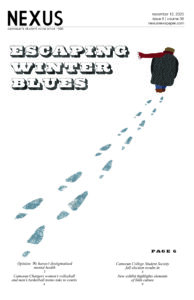Mental health has become a mainstream topic over the last decade. There have been countless TV shows and articles about anxiety and depression, suicide awareness, and eating disorders. It’s important to have these discussions, but we haven’t eliminated the stigma around mental illness nearly as much as we like to think.
Yes, people will say they are diagnosed with some of the “acceptable” mental illnesses or neurodivergences: anxiety, depression, ADHD. Even then, we rarely hear about the ugly sides of things. Everyone has felt sadness before and can relate to stories of depression, but they get uncomfortable with the reality of it. Those dark episodes where you can’t get out of bed or brush your teeth, the suicidal ideation, that numb feeling that clouds every waking moment. As soon as the illness starts to produce ugly symptoms, people get very uncomfortable.

Furthermore, barely anyone talks about the “scary” mental health disorders: bipolar, schizophrenia, dissociative disorders, personality disorders. A lot of these disorders produce what are called positive symptoms—adding something that isn’t part of the normal human experience, like hallucinations. As soon as anyone mentions psychosis and its related disorders, the conversation stops. People pause and call those suffering from these ailments “crazy” or say that they need to be locked up in a psych ward.
I’m diagnosed with bipolar disorder type 1, which includes psychotic features. Whenever I mention this to people, I get something along the lines of “but you seem normal.” It’s so strange when I think about how I can openly talk about my mild depressive symptoms and people are sympathetic, but as soon as I mention the mania or psychosis those same people will change the subject or just leave. I feel like I’m walking on a tightrope of what is and isn’t acceptable to discuss.
It infuriates me when people say things like “I’m so bipolar” because of normal mood swings or saying someone has OCD because they like their things organized. Mental-health diagnoses are not fun adjectives to use for exaggeration or comedy. They are serious health issues and reducing them to stereotypes is genuinely harmful to the people suffering from those disorders.
These stereotypes can make it harder for people to get help. No one wants to be deemed a “crazy person” because they’re sick. No one wants their friends and family to think less of them because they need medical help for their psychological problems.
Even medical professionals have biases against mentally ill people. There have been so many times I’ve seen doctors and they blame unrelated things on my bipolar, or suggest that I’m making up all my symptoms because of my diagnosis. It is so hard to be taken seriously after you’ve been labelled “crazy.”
We’ve come a long way in how we view mental health as a society. We no longer use bloodletting or lobotomies to try to physically remove what is making someone mentally ill. Medical knowledge and treatments have advanced significantly over the last 100 years.
But we aren’t there yet. We have not destigmatized mental illness beyond the mildest cases of anxiety and depression. This is in part because those are feelings everyone has felt before, to some extent. Beyond that, it does feel scary. Psychosis is far scarier and more dangerous to the person experiencing it than those around them, and they need support instead of judgement in those moments. We’ve come a long way, but we have so much further to go if we want to really help people.
